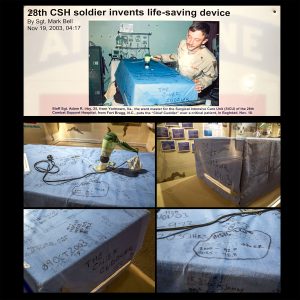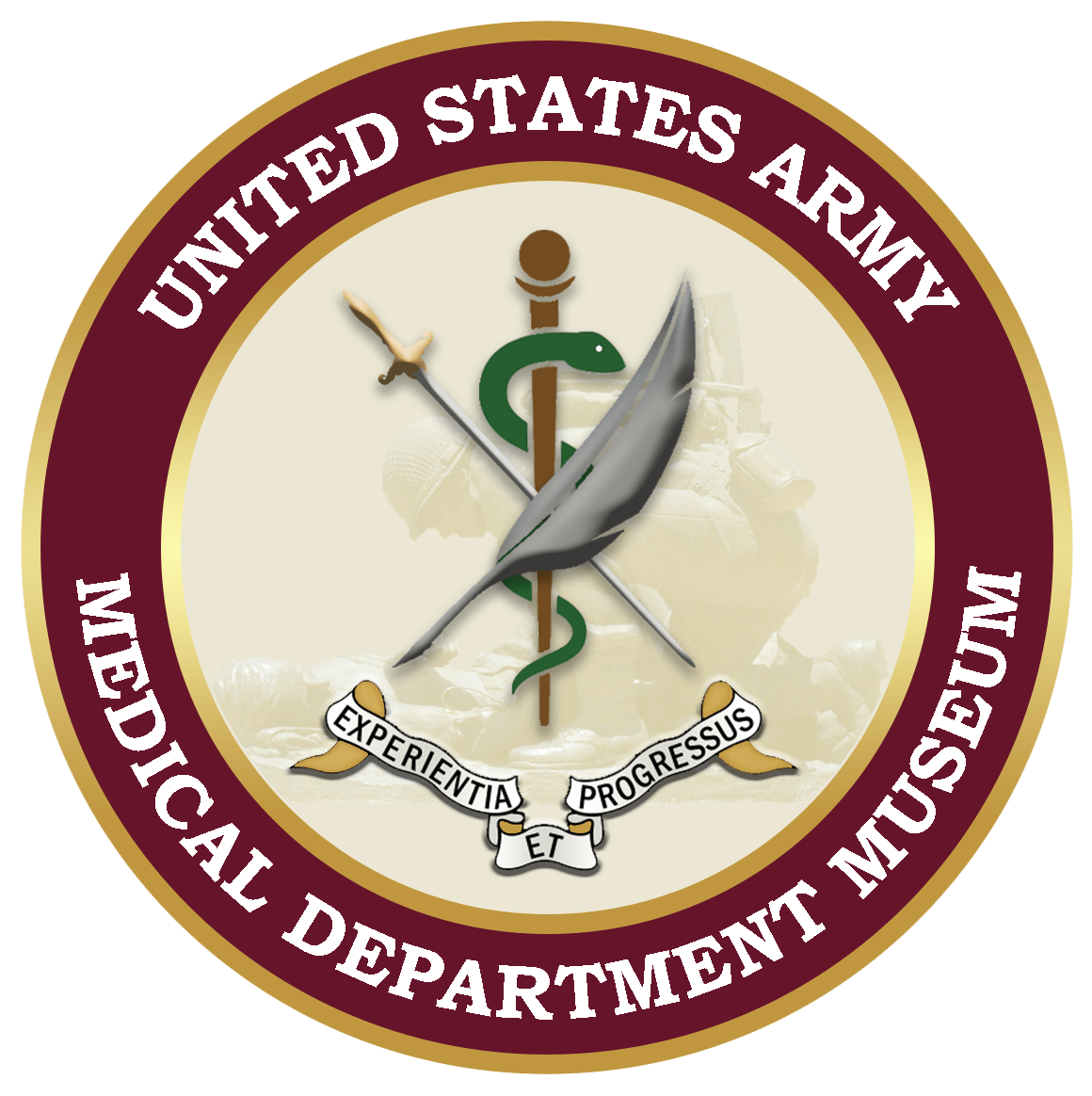28th CSH Soldier Invents Life-Saving Device
28th CSH Soldier Invents Life-Saving Device
By Sgt. Mark Bell, 19 NOV 2003

Baghdad, Iraq - What do cardboard, plastic pipe, tape and a hair dryer have in common? Probably nothing, but add Staff Sgt. Adam R. Irby into the equation and you get an effective life-saving device proven in combat situations.
As the 25-year-old ward master, from Yorktown, VA, for the Surgical Intensive Care Unit (SICU) of the 28th Combat Support Hospital, from Fort Bragg, NC, which is currently deployed in support of Operation Iraq Freedom, Irby said they needed something to warm patients who have lost a large amount of blood.
The result is a makeshift blue cardboard box, which resembles a young child’s playhouse, but is more commonly known to the staff at the 28th CSH as the “Chief Cuddler.”
“We receive critically-injured patients who often suffer from mass amounts of blood loss,” Irby said. “With blood loss the patient’s temperature will start to drop. With this drop in temperature the patients lack the ability to stop the internal bleeding.”
Dr. (Capt.) Tracey Lyon, 32, from Wilton, Conn., a 28th CSH staff anesthesiologist, said the body needs heat to allow blood to clot.
With the help of Maj. W. Greenly, 36, from North Olmstead, OH, the head nurse of the SICU, Irby’s innovative and creative side came into good use. Greenly then approached Irby with a hair dryer to see if there could be a better way the common household device could be used to warm patients.
“He’s a jack-of-all-trades,” Greenly said about Irby. “He can take an ordinary item and turn it into anything we need to accomplish the mission.”
Under normal conditions, doctors and surgeons would use a “Bear Hugger” blanket, which incorporates small ventilation pipes distributing warm air around the patient, said Lyon. She said the hospital has been waiting four months for the arrival of the blankets, which cost more than $900 each. In the mean time, the “Chief Cuddler” has been working hard to save lives.
“I constructed the ‘Chief Cuddler’ out of old cardboard boxes and Greenly’s hair dryer,” Irby said. “It creates a micro-environment of about 105 degrees and will bring a patient from about 90 to 98.6 degrees in about three hours, almost a three-fold decrease in time.”
Lyon said the box creates a small medical greenhouse, which allows the patient to stop bleeding on his or her own and allows for a more stable transport out of country.
“We have seen soldiers safely evacuated to Germany, where we know they will receive definitive treatment and be able to see their families, thanks to all the personnel who work in the 28th CSH,” he said. Already, the “Chief Cuddler” has assisted in saving over 20 lives since its creation, he said. Those lives are documented on the outside cover with each patient’s number, and the date and time it was used.
Irby said he gets the most satisfaction from his job when he is able to save a life of a soldier who has been injured on the battlefield.
“The most important aspect of my job is that I am able to keep a highly critical-care area functioning,” he said. “I enable the officers and enlisted soldiers to accomplish the great care they provide to the soldiers who are injured defending us on the frontline.”
Additionally, Irby is responsible for maintaining expensive and sensitive medical equipment and ensuring that his staff has the critical supplies they need to accomplish the mission.
“He’s awesome because he is clinically competent,” Greenly said about Irby. “He knows how everything works, and he knows the needs of the hospital. Because the knows what we need, he
is able to modify equipment to accomplish the mission.”
Just as important, Irby enjoys being a mentor. “I also provide guidance to my enlisted soldiers, and ensure that they leave here a more knowledgeable health care provider,” he said. For Irby, being in Iraq for the past eight months has been what he has been training to do since joining the Army. Providing care, not only to American soldiers, but also to Iraqi civilians and detainees, has been a challenge.
“We have seen Iraqi civilians, who were in the wrong place at the wrong time, go from completely on life support, to be able to leave here a go back to their own families,” he said. “We have seen Iraqi detainees treated here, where the information they will provide may be more valuable in allowing the U.S. to accomplish its mission and send its soldiers back home.”
Although patients will probably never see or interact with Irby, for him, knowing there are families waiting for the injured soldiers’ safe return back to loved ones is enough thanks and gratitude for himself. Watching Irby, one could easily guess him for a quiet soldier who shows up to work each day doing a job he loves.
“This guy is the epitome of any noncommissioned officer,” Greenly said. “His selfless service shows in his soldiers. It’s very obvious he is a soldier’s soldier.”
If you ask Irby who he is, he’s an everyday soldier working on his small part of the mission to return Iraq to normal.
“I am just a common-sense guy who tries to leave a positive mark wherever I go,” he said. “I try to do what is right for my soldiers, the soldiers we treat, and the unit by trying to implement even the smallest of changes that will better our capabilities.”
© 372nd Mobile Public Affairs Detachment
